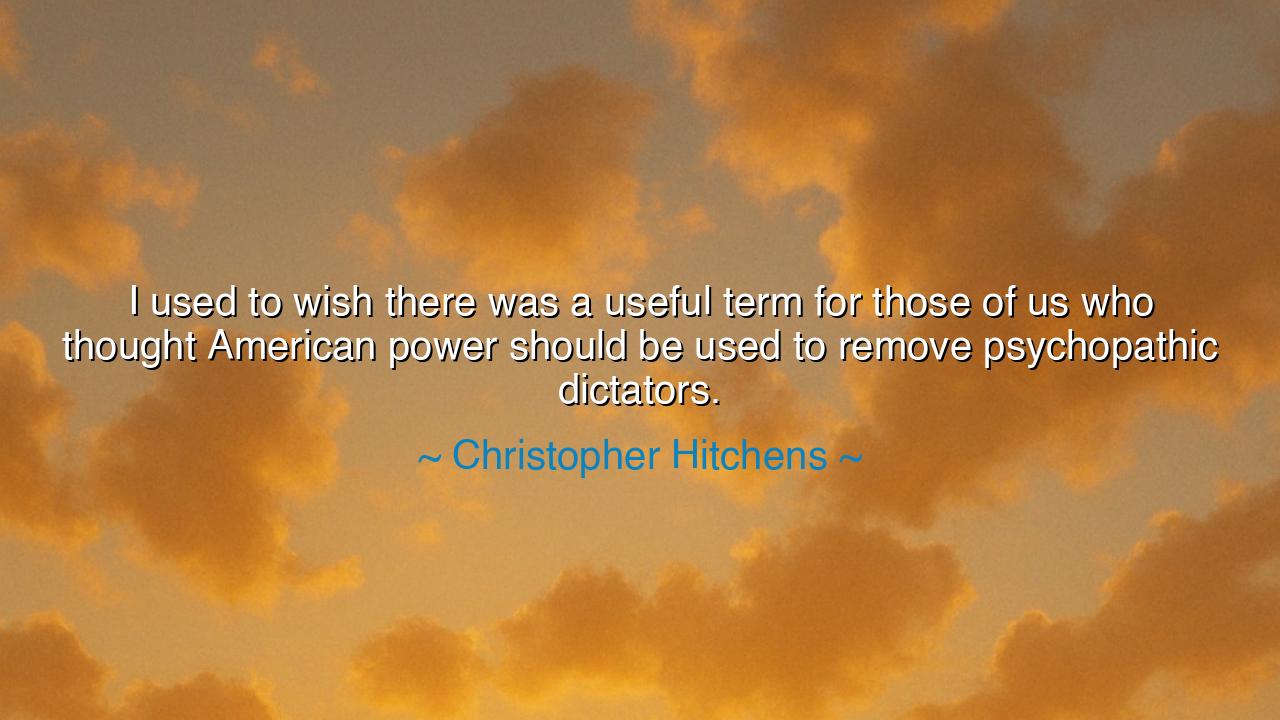
I used to wish there was a useful term for those of us who
I used to wish there was a useful term for those of us who thought American power should be used to remove psychopathic dictators.






Listen well, O children of the future, for I bring you the wisdom of Christopher Hitchens, who once said: "I used to wish there was a useful term for those of us who thought American power should be used to remove psychopathic dictators." These words call upon a moral imperative that transcends time—the idea that when evil takes root in the form of tyrants, it becomes the duty of the world’s powerful nations to act. But Hitchens was also reflecting on the difficulty of labeling those who, driven by moral conscience, seek to use power not for self-interest but for the removal of those who oppress and destroy the lives of their people. It is a profound truth: that the fight against tyranny must be seen not as imperialism, but as a righteous act of justice.
Consider, O children, the ancient conquerors who were not driven solely by personal ambition but by the noble desire to remove oppressive rulers. Alexander the Great, while often seen as a conqueror for the sake of conquest, also sought to unite fractured lands and end the reigns of despots who tormented their people. His vision was not only of empire but of a world where the injustices of tyrannical rule could be overturned. Though his methods were not without flaw, his vision carried the seed of a noble cause—that power should be used to liberate, not oppress.
In more recent times, consider the Allied forces during World War II, who took it upon themselves to dismantle the regime of Adolf Hitler, one of the most psychopathic dictators history has known. The world witnessed the horrors wrought by his tyranny, and it was the strength of the American military, joined with the resolve of other nations, that ultimately ended his reign of terror. The wisdom of the world at that time was clear—evil must be opposed, and when confronted with such savagery, the global community must act with decisiveness. The allies did not simply fight for territory or power; they fought for the preservation of human dignity, the restoration of freedom, and the removal of a tyrant who threatened the very fabric of civilization.
There is, too, the example of Saddam Hussein, whose dictatorship in Iraq was characterized by violence, cruelty, and the suffering of countless innocents. Many, including Hitchens, believed that the American intervention to remove Hussein, though controversial, was a necessary act to end a regime that perpetuated psychopathy and brutality. While the aftermath of the invasion was fraught with difficulties, the decision to remove such a dictator was rooted in the desire to free the oppressed people of Iraq from tyranny. This moral stance, while contested, reveals the complex nature of using power in the name of justice.
So, O children, let this truth resonate within your hearts: power is not only a force for domination, but for liberation. The removal of tyranny is a noble cause, though fraught with complexities. As Hitchens so provocatively pointed out, those who advocate for the use of American power to dismantle psychopathic dictators are often misunderstood, yet their cause is rooted in justice. It is not for us to sit idly by as the innocent suffer under the hands of tyrants; rather, it is the duty of those who hold the power to act decisively in their defense. But let us always remember, in the wielding of power for good, we must remain ever watchful to ensure that it is not misused, for even the most righteous of causes can be tainted by the corruption of power.






BC#2 Bao Chau
From a philosophical angle, this statement challenges the concept of moral responsibility at a national scale. If individuals have a duty to stop cruelty, do nations bear the same obligation? Or does the pursuit of geopolitical stability override ethical imperatives? I wonder whether Hitchens believed that inaction in the face of tyranny makes a country complicit—or whether the use of force inevitably corrupts even noble intentions.
VKNguyen Van Kien
I can feel the tension in this thought—a desire for moral clarity in an immoral world. It’s hard not to sympathize with the idea of confronting evil, yet history reminds us that even the most righteous wars leave deep scars. Maybe what Hitchens was getting at is the discomfort of living in a world where both action and inaction carry guilt. How do we reconcile that dilemma as global citizens?
PLPhuong Loli
This quote sparks an important question: who gets to decide which dictators are 'psychopathic' and which regimes deserve intervention? The language of morality can be dangerous when tied to national power. It’s easy for governments to justify self-interest under the banner of righteousness. Shouldn’t there be an international mechanism—beyond one country’s judgment—to determine when force is truly warranted for humanitarian reasons?
GDGold D.dragon
Reading this, I sense frustration with the moral gray areas of global politics. Hitchens seemed to wish for clarity in defining what kind of intervention is justifiable. But can there ever be a universally accepted standard for when a powerful nation should act? It feels like every case—whether Iraq, Libya, or others—ends up judged through hindsight, not principle. I wonder if moral interventionism can ever escape political hypocrisy.
TTToan Truong
I find this quote both compelling and troubling. It assumes that American power can be a force for good, but history shows that interventions often replace one form of tyranny with another. Do you think it’s even possible to remove a dictator without imposing a new kind of control? Maybe the real issue isn’t just getting rid of psychopathic leaders, but figuring out how to support stable, self-determined societies afterward.